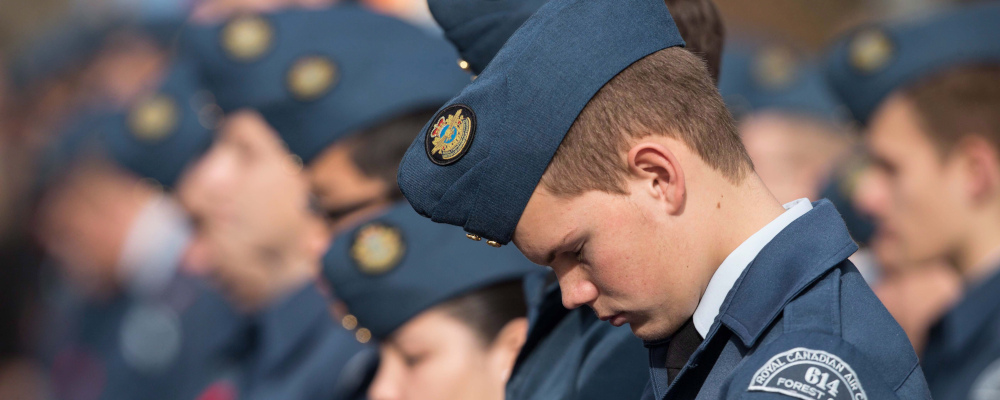Earlier this month the Chaplain General of the Canadian Armed Forces (CAF) issued an updated directive that effectively bans military chaplains from praying at public ceremonies.
The observation in the new directive is that while some CAF members pray, they may pray in different ways and some do not pray at all. To address these differences, the CAF will implement an uncreative “inclusivity” solution—erasing prayer from public events. Written in bureaucratic language, the average reader could be forgiven for missing the subtext of the new directive. Especially after seeing Defence Minister Bill Blair’s claim that “chaplains are not—and will not be—banned from prayer on Remembrance Day, nor at any other time.”
But with all due respect to the minister, he is far from the “average reader.” And his claim is simply not true, evidenced first by the renaming of the directive from “Public Prayer at Military Ceremonies” in 2013 to the new “Spiritual Reflection in Public Settings”. The 2023 update directs chaplains to “carefully choose words that are inclusive…mindful of the Gender Based Analysis (GBA+) principles.” By this logic, military chaplains are allowed to pray in public but only if they manage a prayer that makes no reference (or at least “careful” reference) to a (gendered) deity (think “Mother Earth” in Indigenous spirituality or “Heavenly Father” for Christians). The average reader will note that this is contrary to a basic understanding of, well, prayer.
The doublethink is obvious: the CAF will achieve inclusion through exclusion and chaplains can pray without praying. If this is how the federal government intends to implement religious neutrality, the least it can do is admit to it rather than claiming that public prayer by chaplains is permitted when clearly it is not. The government may be doublethinking, but it’s insulting to expect the rest of us to do the same.
According to this new inclusivity, chaplains must protect military members from beliefs they may not share by erasing expressions of all belief in the public square. Critics will cry foul. They will say that Christians are trying to preserve a privileged position in society. But a moment of reflection will show that this directive has implications for all people of faith since it warns that certain religious dress or symbols “may cause discomfort or traumatic feelings”. In essence, the chaplain general is asking chaplains to remove all crosses, collars, kippahs, hijabs, crescents, turbans, kirpans, or tilaks if they have the potential to make CAF members uncomfortable at public ceremonies. Chaplains can pray prayers devoid of meaning and erase any outward sign of religiosity at public events.
The purported intention behind the directive is to protect CAF members from discomfort or trauma at public events where they are required to attend. These are the CAF members who, let’s remember, join the military which exercises the armed force of the Canadian state. We’re talking about life and death—the capacity for and the exercise of actual physical violence. But the new doublethink inclusivity wants to promote safety-ism for military members who enlist to do the most unsafe things. It seeks to protect from harm those who have risked, are risking, and will risk ultimate harm to their lives. CAF members do face serious harm and trauma in their duties, but does the CAF leadership really accept that religiously specific prayer at public events warrants harm reduction and trauma sensitivity?

When CAF members enlist to fight for our country, our freedom of religion is part of what they defend. This includes the freedom not to believe and the freedom to believe something fundamentally different from my neighbour. Public events like Remembrance Day are one of the few occasions where we gather, as civilians and military personnel, to honour those who paid the highest price for our freedoms. Canada should stand as a model around the world for how to promote a robust pluralism where citizens can fundamentally and peacefully disagree. Instead of erasing religious belief from the public square, we should actively exercise and uphold the freedoms that so many died defending.
The alternative to the directive seems obvious. This Remembrance Day, the CAF should strive to have a greater plurality of chaplains represented at public events and permit them to pray in accordance with their specific beliefs. The Chaplain General should think again about his doublethink and repeal this directive. Rather than promoting inclusion through exclusion, the CAF should pursue inclusion through inclusion instead.
Recommended for You

Laura David: Red pill, blue pill: Google has made its opening salvo in the AI-news war. What’s Canadian media’s next move?

The Notebook by Theo Argitis: Mark Carney’s first major tests

The Weekly Wrap: Trudeau left Canada in terrible fiscal shape—and now Carney’s on clean-up duty

Ben Woodfinden: Lament for an ‘elbows up’ nation



